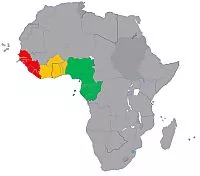Simmering tensions in Sierra Leone have led to a popular uprising partly driven by particularly high rise price rises (see: Inflation in West Africa, June 2022). These protests will be defused in the short term, but are indicative of increased risk, and the government transition process remains challenging ahead of the 2023 elections.
SIGNIFICANCE – ECONOMY AND DISSENT
On 10 August, security forces violently put down protests in the capital Freetown and opposition areas in the north. Police stations were burned and there were fatal shootings. The government views the uprising as an attempt to overthrow President Maada Bio, and a nationwide curfew has been declared for an indefinite period.
The protests were inspired by popular figures such as Adebayor and Egerton Shabba1, whose social media broadcasts have gained a large following in the context of tensions between the ruling Sierra Leone People's Party (SLPP) and the main opposition All People's Congress (APC), and cost of living pressures. Consumer price inflation has increased from 16.7% at the start of the year to 28.0% in June2.
During this period in which the inflation rate has almost doubled. opposition leaders have been arrested in a crackdown on dissent over issues such as the 2021 census (See: Sierra Leone's new census figures favour ruling party ahead of 2023 elections). Many people are also unhappy that President Bio rarely engages with constituents and is often absent from the country. He has been in the UK on a 'private' visit since 28 July, prompting adverse media reports about how these trips are being funded given the state of the economy at home.
OUTLOOK – TRANSITION
Elections in which Bio will be contesting for a second term are scheduled to be held in June next year, and we are revising our risk rating on the transfer of power from moderate to high due to: (a) this week's events, escalating the simmering tensions described in previous briefings; see: Sierra Leone proposes new electoral law before 2023 polls, and (b) the absence of reform to clarify the legal framework. Bio himself was quickly sworn in at a hotel just hours after the electoral commission declared he had won the 2018 election. Now, the available version of the Public Elections Bill that parliament passed last month still lacks a timeframe for concluding post-election litigation, and the nature of a 2018 change in Supreme Court leadership further signifies gaps in institutional independence.
Footnotes
1. Footballer Emmanuel Adebayor and popular DJ Egerton Shabba
2. For food and non-alcoholic beverages, it is 28.9%, according to the most recent official data.
The content of this article is intended to provide a general guide to the subject matter. Specialist advice should be sought about your specific circumstances.

